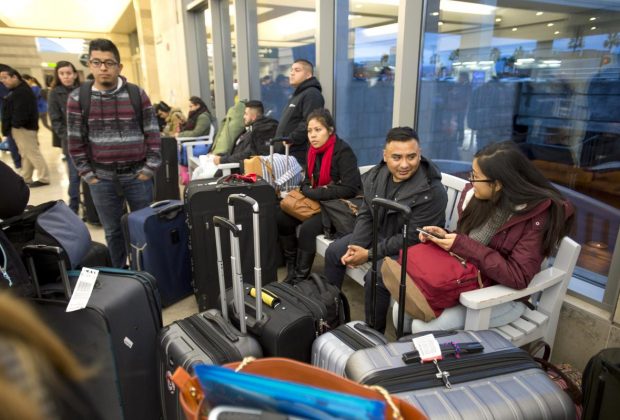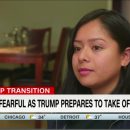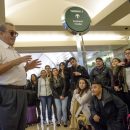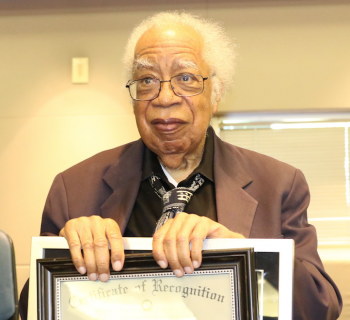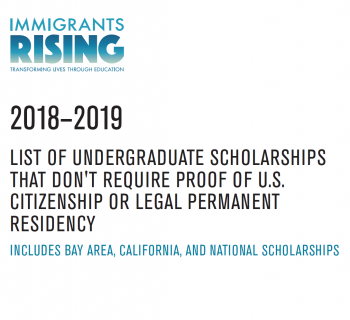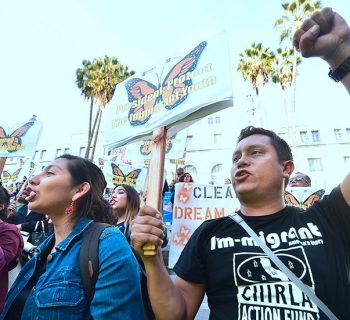By ROXANA KOPETMAN and ALEJANDRA MOLINA / STAFF WRITERS / The OC Register ~ Dec. 23, 2016
http://www.ocregister.com/articles/students-739289-daca-travel.html
COSTA MESA – Concerned their legal status in the United States could be upended by Donald Trump, 25 college students and recent graduates who initially arrived here illegally left John Wayne Airport for Mexico on Thursday and will return before he becomes president.
The students, most from California, saw the study-travel trip as a way to reconnect with their cultures and their families before Trump takes office and possibly eliminates the program that allows them to travel.
“There’s so much uncertainty,” said Raquel Zamora Gonzalez, 25, a Cal State Fullerton student. “I’m going to grab this opportunity while I can.”
She and her fellow travelers have temporary legal status thanks to a 2012 program created by President Obama, Deferred Action for Childhood Arrivals, more commonly known as DACA.
Under a little-known provision of the law, these “DACAmented” individuals – as they call themselves – can get the U.S. government’s permission to travel abroad and return.
A huge added bonus: The legal re-entry into the U.S. can boost the chance to win permanent legal status.
“I didn’t realize it would change my status until I was already in the process of applying,” said the Garden Grove resident whose parents brought her to Orange County when she was 1 year old. She raised $5,000 for the trip with the help of others. “It was a plus, but not the main reason I wanted to go.
“I want to go back and meet my family and where I came from,” she said.

Raquel Zamora, a student from Cal State Fullerton, says goodbye to her mother, Martha Zamora, as Raquel Zamora joins a group heading to Mexico City at John Wayne Airport in Santa Ana, on December 22, 2016.
A group of 25 people, all who have DACA status, are being led by Cal State Long Beach professor Armando Vazquez-Ramos on an educational trip to Mexico City.
The 25 people, all brought to the U.S. illegally as children, applied to go abroad through a process called "advanced parole."
The DACA program, which offers those who qualify legal residency and a work permit for two years, was created by President Obama through an executive action. The temporary status is renewable every two years.
(Photo by Jeff Gritchen, Orange County Register/SCNG)
The students and recent graduates are participating in an intense three-week program designed by Cal State Long Beach Professor Armando Vazquez-Ramos, who began arranging language and cultural travel-study programs with DACA students two years ago.
What began as an experiment with two Cal State Long Beach students has grown to trips with as many as 35. In all, he’s taken 107 young to visit their homeland.
“This is the last one that we can plan on, because right now, with the election of the unmentionable president-elect, it’s unforeseeable what’s going to happen,” Vazquez-Ramos said.
During his campaign, Trump pledged to deport all 11-plus million immigrants living in the country illegally and abolish DACA. He has since appeared to have softened his stand on DACA recipients, but it’s unclear what he intends to do.
The president-elect’s words have moved leaders at universities across the country to urge their students in study-abroad programs to return to the U.S. before Jan. 20, when Trump becomes president.
The Cal State system sent an email to its campuses in November warning of the “very realistic possibility” that DACA students who are abroad could be locked out after Jan. 20, when Trump apparently could abolish DACA by tapping his executive authority.
“Immediately advise students who are already abroad to consider returning to the United States as early as practicably possible given the uncertainty of the situation,” the Nov. 14 letter states.
Besides those with Vazquez-Ramos, there are about 10 Cal State University students studying abroad, a spokeswoman said this week. A number was not available for how many DACA students at UC campuses are abroad or have participated in the program.
The so-called advance parole provision, which allows the DACA recipients to travel outside the U.S., is typically granted for educational, employment or humanitarian purposes.
Those granted advance parole can re-enter the country legally, which paves the way for possible permanent legal status to those who are later sponsored by a U.S. citizen, an employer or who marry a U.S. citizen.
DACA recipients usually need to apply for this travel document three months in advance, but recently, in light of the pending Trump presidency, some are asking for permission on an emergency basis.
Seen as a loophole, anti-illegal immigration advocates criticize the process.
“Here you have people trying to use this as a permanent back-door entry,” said Ira Mehlman, a spokesman with the Federation for American Immigration Reform, a Washington, D.C.-based group that advocates for better border security and against illegal immigration.
The Obama administration is abusing advance parole by allowing undocumented immigrants to circumvent provisions in the law that would normally bar their admission back into the U.S., Mehlman said. He called the DACA program unconstitutional and said it should be disbanded.
Through the non-profit California-Mexico Studies Center, founded by Vazquez-Ramos, college students and recent graduates can split their time between visiting their families and a language school in Cuernavaca.
Cal State Long Beach senior Sheila Salinas, of South Los Angeles, plans to spend Christmas with relatives in Puebla, then travel to Chalco where she was born, before heading to Cuernavaca.
“Even though I was raised in Los Angeles, I feel like there’s a lot that’s been missing,” said Salinas, who arrived at the airport with two suitcases and carry-ons. “I want to see where I lived and compare the difference it has made in my life and (consider) the sacrifices my parents made.”
Alvaro Castillo, 23, a Cal State Northridge student, and his cousin, Robert Castillo, 23, of Santa Ana College, will visit their grandmother in Nayarit. Alvaro Castillo, on his second trip to Mexico, said he hopes to absorb even more this time around. His goal is to write about the experience for a master’s thesis, and maybe publish it as a book.
Brayan Vazquez, 21, of Miami-Dade College in South Florida, said he’s going to Mexico as a representative of his family – to hug his grandmother the way his mother wishes she could: “When I started the program I thought it was about me, but it’s also about closing that emotional gap in my families.”

